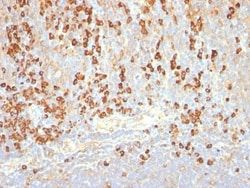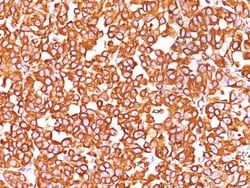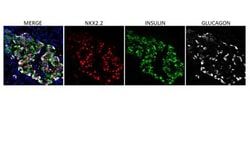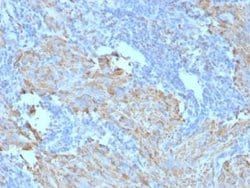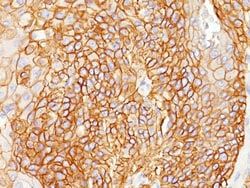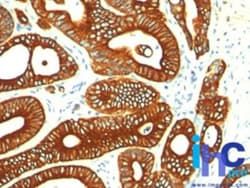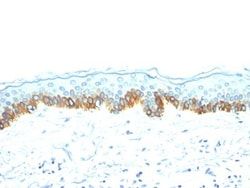PMEL17/SILV Antibody (NKI-beteb), Novus Biologicals™
Manufacturer: Novus Biologicals
Select a Size
| Pack Size | SKU | Availability | Price |
|---|---|---|---|
| Each of 1 | NBP229407-Each-of-1 | In Stock | ₹ 46,636.00 |
NBP229407 - Each of 1
In Stock
Quantity
1
Base Price: ₹ 46,636.00
GST (18%): ₹ 8,394.48
Total Price: ₹ 55,030.48
Antigen
PMEL17/SILV
Classification
Monoclonal
Concentration
0.2 mg/ml
Dilution
Immunohistochemistry, Immunohistochemistry-Paraffin 1-2 ug/ml, Protein Array, Flow (Intracellular)
Gene Alias
D12S53EP1, gp100, ME20, ME20-M, melanocyte protein mel 17, Melanocyte protein Pmel 17, Melanocytes lineage-specific antigen GP100, Melanoma-associated ME20 antigen, melanosomal matrix protein17, PMEL17P100, premelanosome proteinME20M, SI, SIL, silver (mouse homolog) like, silver homolog (mouse), Silver locus protein homolog, silver, mouse, homolog of, SILVPmel17
Host Species
Mouse
Purification Method
Protein A or G purified
Regulatory Status
RUO
Gene ID (Entrez)
6490
Target Species
Human, Equine
Form
Purified
Applications
Immunohistochemistry, Immunohistochemistry (Paraffin), Peptide Array, Flow Cytometry, Immunohistochemistry (Frozen)
Clone
NKI-beteb
Conjugate
Unconjugated
Gene Accession No.
P40967
Gene Symbols
PMEL
Immunogen
Lymph node pigmented melanoma metastases extract was used as the immunogen for the gp100 NKI-beteb antibody
Quantity
0.1 mg
Primary or Secondary
Primary
Test Specificity
By immunohistochemistry, it specifically recognizes a protein in melanocytes and melanomas. This monoclonal antibody reacts with junctional and blue nevus cells and variably with fetal and neonatal melanocytes. Intradermal nevi, normal adult melanocytes, and non-melanocytic cells are negative. It does not stain tumor cells of epithelial, lymphoid, glial, or mesenchymal origin. This Mab labels formalin-fixed, paraffin-embedded melanomas and other tumors showing melanocytic differentiation.
Content And Storage
Store at 4C.
Isotype
IgG2b κ
Description
- PMEL17/SILV Monoclonal specifically detects PMEL17/SILV in Human, Equine samples
- It is validated for Flow Cytometry, Immunohistochemistry, Immunohistochemistry-Paraffin, Protein Array, Flow (Intracellular).
